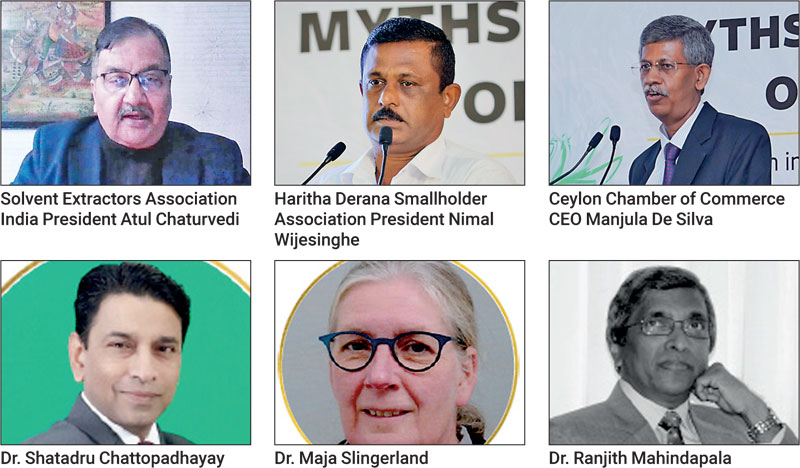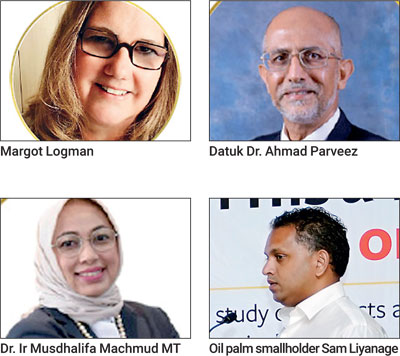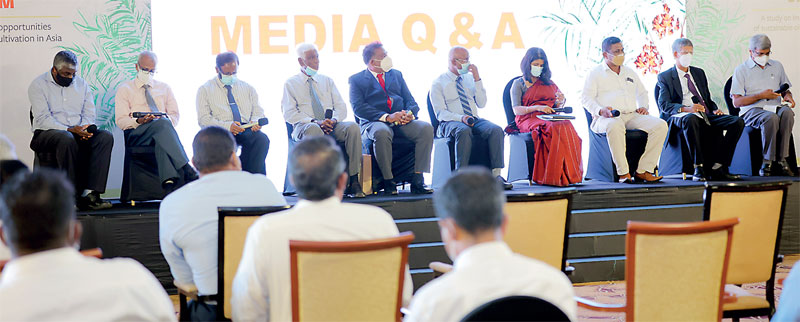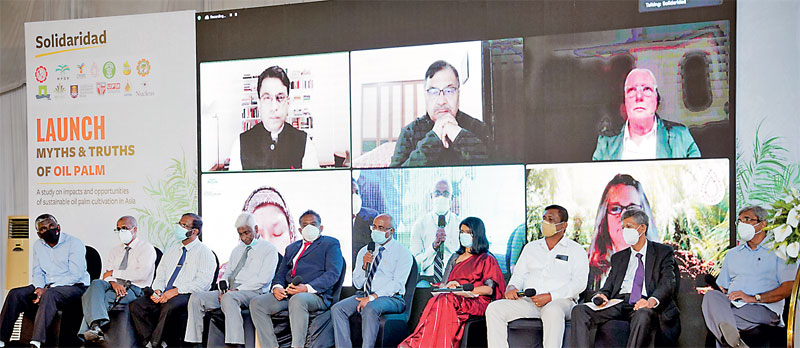Monday Feb 16, 2026
Monday Feb 16, 2026
Wednesday, 26 January 2022 02:16 - - {{hitsCtrl.values.hits}}

 By Anumita Ghosh
By Anumita Ghosh
Oil palm is considered to be one of the most competitive vegetable oil crops in terms of productivity. The crop provides five times as much vegetable oil per hectare compared to alternative crops, such as coconut, and sequesters more carbon per hectare than tea and coconut.
According to studies conducted by Sri Lankan scientists, per litre of palm oil requires less fertiliser and less water than coconut, dry rubber or tea. The crop primarily uses rainwater for cultivation, and there is no evidence of palm oil plantations causing groundwater depletion. Yet, despite a wide range of virtues, the Sri Lankan Government has decided to ban palm oil production, ordering replacement of oil palm trees with rubber plantations, on grounds of unfavourable environmental and social impacts.
 Unfortunately, palm oil has been at the receiving end of a perception that is nurtured based on unfavourable emotions as opposed to facts. Claims of oil palm plantations leading to widespread deforestation and damage to ecosystems have hardly any transparent scientific research backing them. In Sri Lanka, oil palm does not replace forest but other plantation crops, primarily rubber or coconut. Therefore, its biodiversity performance needs to be compared with these crops, and as found in various studies, the differences in biodiversity between oil palm, rubber, tea and coconut plantations are neither significant nor conclusive.
Unfortunately, palm oil has been at the receiving end of a perception that is nurtured based on unfavourable emotions as opposed to facts. Claims of oil palm plantations leading to widespread deforestation and damage to ecosystems have hardly any transparent scientific research backing them. In Sri Lanka, oil palm does not replace forest but other plantation crops, primarily rubber or coconut. Therefore, its biodiversity performance needs to be compared with these crops, and as found in various studies, the differences in biodiversity between oil palm, rubber, tea and coconut plantations are neither significant nor conclusive.
In an attempt to break the myths around palm oil and its production, Solidaridad has released the ‘Myths and Truths of Oil Palm,’ a research-based scientific study that provides information and assessments on palm oil through an in-depth literature review on research findings by over 15 leading scientists from top universities and research institutions across Indonesia, Malaysia, India and Sri Lanka. A result of extensive research, the publication vividly portrays the social, economic and environmental impacts of oil palm production.
Research highlights
The launch of the study was held on 19 January, in a hybrid event with scientists, Government Ministries and Departments, research institutes, private sector, community organisations, media and other participants from Sri Lanka, joining the event physically. Panellists and participants from India, Indonesia, Malaysia, the Netherlands and other parts of the world attended the event virtually.
Among the panellists, Solidaridad Asia Managing Director Dr. Shatadru Chattopadhayay began the session on a strong and positive note, highlighting the socio-economic impacts of the crop.
“Stop condemning palm oil while adulating other oils, especially when we know that palm oil provides livelihoods to thousands of communities,” he said, setting the tone of the session.
Professor Maja Slingerland from the Wageningen University of the Netherlands, who is also the study reviewer and editor, spoke at length on the impacts and opportunities of oil palm cultivation in Asia.
Research scholar Dr. Ranjith Mahindapala, presented the audience with the key findings and recommendations from the publication.
The panellists also included Ceylon Chamber of Commerce CEO Manjula De Silva, Musdahlifah Machmud from Indonesia’s Coordinating Ministry for Economic Affairs, Atul Chaturvedi from India Solvent Extractors Association and Dr. Ahmad Parveez Ghulam Kadir from the Malaysian Palm Oil Board, among others.
One of the panellists, European Palm Oil Alliance (EPOA) Secretary General Margot Logman, delivered a powerful argument through her presentation stating: “Only alternative to palm oil is sustainable palm oil”. She proffered an urgent call to action in support of oil palm cultivation.
“We need to tell the complicated truth about sustainable palm oil, not a simple story. We need to win the trust of consumers with facts, and not emotions, in support of palm oil in Europe,” Logman said.
Logman’s call for a perception makeover of the crop was echoed in the smallholder representative Nimal Wijesinghe’s address to the audience.
The Haritha Derana Smallholder Association in Sri Lanka President narrated how the small farmers in the region had developed misconceptions about oil palm primarily because they did not grow it and were not aware of the truths about the crop. “On learning about the higher profit and income of oil palm cultivation over other crops, they asked me: Can’t we grow this crop?”
Wijesinghe’s appeal to the authorities marked the perfect denouement to the session as he urged: “Give this crop to the smallholder; give it to the person who owns half an acre of land…the person who can grow only 25 trees. That would be the real Samurdhi (prosperity; also, the name of a Government welfare scheme for low-income families in Sri Lanka).”

Expert scientists panel

International and SL panel of experts

(The writer is a Senior Editor and communication professional at Solidaridad Asia – an international sustainability organisation, and can be reached at [email protected])